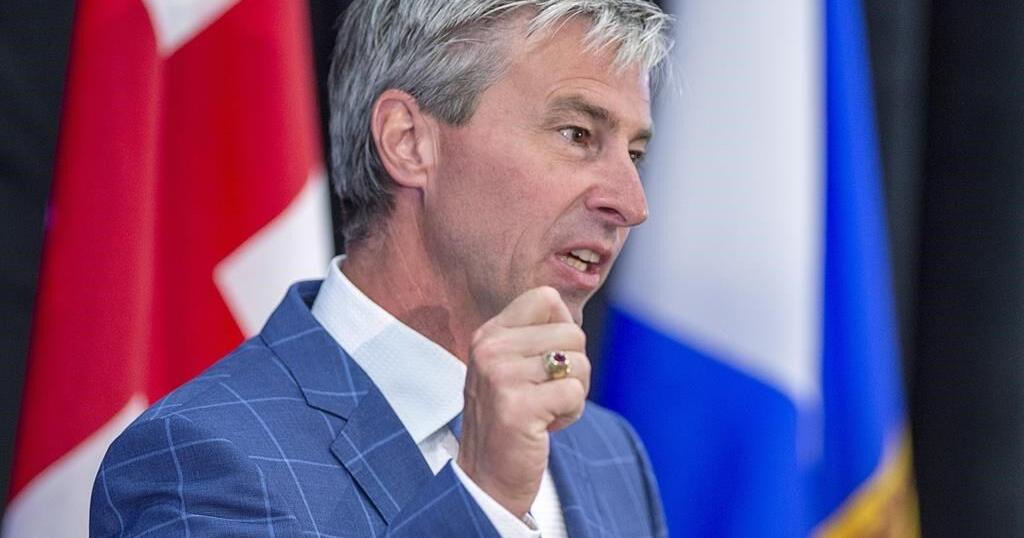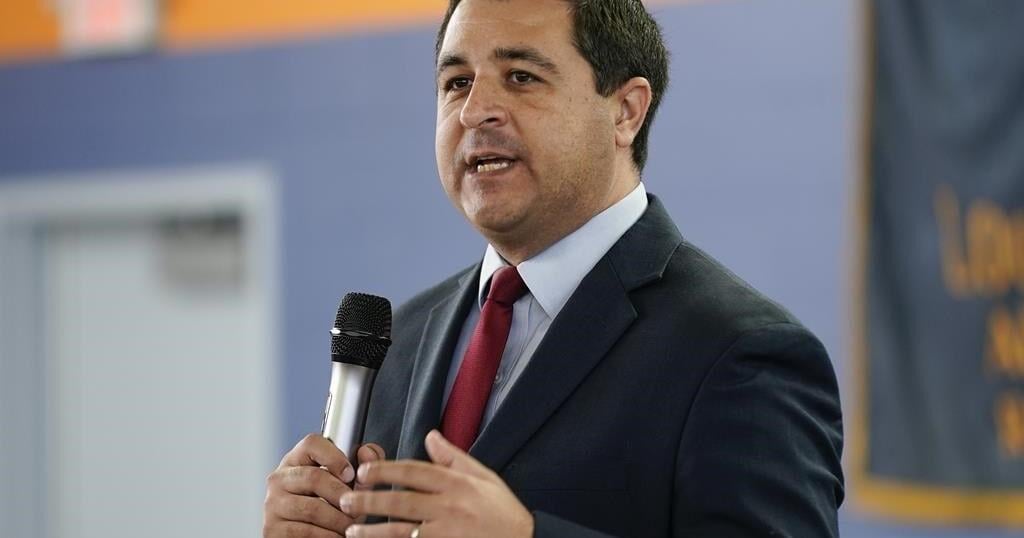HALIFAX – Campaign promises to fund mental health care, reinstate public school boards and give tax breaks for dog adoptions are among the pledges that, nearly three years into his mandate, Nova Scotia Premier Tim Houston has either tossed aside or been slow to enact.
On the cover of the Progressive Conservatives’ 140-page 2021 party platform, the smiling would-be premier’s picture is surrounded by bold yellow text that reads, “Hope for health care,” “Better paycheque guarantee,” and “Universal mental health care.”
Houston’s government was quick to implement some promises after its Aug. 17, 2021, election, such as new climate change legislation, extended operating room hours to reduce surgery wait times and virtual health care for people without a family doctor. But several key pledges have been nixed.
Their campaign document promised to bring back school boards, which were dissolved in 2018 by the Liberal government in favour of a single advisory council to oversee regional education districts. “Abolishing school boards abolished a critical check and balance in the system,” it said. “As such, your PC government will return to school boards.”
However, a statement last week from the premier’s office confirmed the province has abandoned the idea. “We are not reinstating school boards,” spokesperson Catherine Klimek said in an email. Instead, Klimek said, the Department of Education has been working with families to “better understand” how to increase local input in schools and government and is focused on “enhancing” the role of the existing school advisory committees.
The premier has also turned away from his “better paycheque guarantee.” The proposal was to give Nova Scotia companies a 50 per cent rebate on their provincial corporate taxes if they used the savings to pay their employees more (excluding a company’s top 20 per cent earners.) Houston began walking back from the promised rebate in October. “There are lots of priorities in government and those priorities shift,” he said at the time.
The premier’s office confirmed last week that the better paycheque guarantee is out and instead the government will be indexing personal income tax brackets to inflation beginning with the 2025 tax year — something opposition parties and labour groups have long called for. It will also begin indexing some non-refundable tax credits.
“This will help more Nova Scotians than the better paycheque guarantee would have supported,” the premier’s office said, adding that indexing is expected to result in $150 million to $160 million per year in saved taxes by 2028. Indexation of tax brackets is already in place at the federal level and in every other province except Prince Edward Island.
On the campaign trail, Houston told reporters his government would make the provincial information commissioner an independent officer of the legislature with order-making power — pledging to go further than the former Liberal government’s promised review of the Freedom of Information Act.
“A Progressive Conservative government is one that will have the courage to be held accountable by the people,” Houston said in August 2021. “That means giving order-making ability to the commissioner.”
He has since backed away from that promise, which would have given the commissioner the power to compel the government to comply with her findings, unless it wanted to contest them in court. Currently, the commissioner makes non-binding recommendations. Last September, the government launched a review of information and privacy legislation — similar to the proposed Liberal review it had criticized.
Houston’s office would not say last week if the premier still planned to make the commissioner an independent officer with order-making authority, saying the government would await the end of the review before deciding.
The premier did not make himself available for an interview for this story and instead provided a statement saying, “I’m proud of what our government has accomplished since 2021.” The premier said 181 initiatives were laid out in his ministers’ mandate letters, and 104 of them — 57 per cent — have been completed. Some of Houston’s campaign promises were abandoned before ministerial mandates were written.
Another pledge the government has dropped altogether is its proposed $500 tax credit for Nova Scotians who adopt a dog from a registered animal shelter. The “health benefits of pets, particularly dogs, are undeniable,” the Tories said in their 2021 campaign literature, but now the premier’s office says there are no plans for the tax break.
The canine tax credit was included in the “universal mental health” section of the platform, which promised to include provincial coverage for Nova Scotians who receive care from registered psychologists, social workers and counselling therapists. The party estimated that such a program would cost $100 million a year.
“A PC government will introduce true universal addictions and mental health coverage … Under our system, mental health service providers would be able to direct bill (the province) for set rates of service,” reads the platform.
Government has set up new mental health and addictions clinics, peer support lines and therapy programs for first responders over the past three years, but it remains unclear when universal mental health coverage will come to fruition. The province said work “is well underway” to launch the first insured services program under the mental health plan.
While the premier has jettisoned some pledges — a number of election promises have been checked off.
His government created a tax refund for workers under the age of 30 who are employed in the skilled trades or the video and film industry. It made virtual health care available to residents without a primary care provider and expanded insurance benefits for volunteer firefighters — adding 13 types of cancer to their workplace injury insurance. The province extended the hours that surgeons can operate at some hospitals, and it has adjusted its family physician payment model to increase how much primary care doctors can earn.
Houston’s government has also nearly completed his campaign pledge of ensuring every Nova Scotian has access to reliable internet. The Department of Public Works says work is ongoing to connect 99.99 per cent of Nova Scotia homes and businesses.
The PCs pledged on the campaign trail to “immediately” build and renovate 2,500 new single-bed long-term care rooms. It has plans in action that will see 5,700 new or upgraded long-term care rooms built by 2032. About 500 of these spaces were announced — but not funded — by the previous Liberal government.
The campaign pledge to create a buy-local “Nova Scotia Loyal” program is technically complete — though it bears little resemblance to what was promised three years ago.
Houston’s proposed loyalty card involved people earning points for buying local goods that could be redeemed for discounts for government services, such as licence renewal fees. Instead the province has set up a system that, during one week of the month, will award people bonus points with the Scene rewards program for buying local at Sobeys Inc. grocery stores. It will also come with ramped up marketing and branding for local products. Starting this fall Air Miles will be awarded for local purchases at provincial liquor outlets.
This report by The Canadian Press was first published Aug. 5, 2024.
























